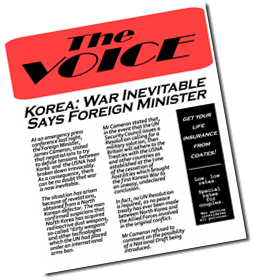 I came across a rather odd question, recently. I will admit that I couldn’t quite understand why it was being asked. On reflection, perhaps I was being unfair – making assumptions based on my own ways of thinking. The question was, in essence: how do you write alternate histories/futures? I hope that I can put right any fault my initial reaction might have revealed.
I came across a rather odd question, recently. I will admit that I couldn’t quite understand why it was being asked. On reflection, perhaps I was being unfair – making assumptions based on my own ways of thinking. The question was, in essence: how do you write alternate histories/futures? I hope that I can put right any fault my initial reaction might have revealed.
Of the two, I would say that alternate histories are the hardest to write. The process involves determining at what point in actual history your alternate branches from. That in itself isn’t quite as straightforward as might be thought. Analysis of past events will often demonstrate that the large events are less key than the small! A major event is, in reality, the culminating consequence of many small events. Altering just one of those small events can, theoretically, have a snowball effect which will change the nature of the major event radically, or eliminate it entirely! So, you don’t look at the major events, other than as a kind of historical Table of Contents. You get to the Chapter in history and then go into the fine detail, to locate exactly what minor event you wish to change. You must, of course, have some idea of the logical progression of events that are consequential to the change you propose. You may need to alter a different event, or even change more than one, to achieve a desired result! And remember: just because you have changed history, it doesn’t mean that the people are entirely different. The same historical personages will exist. Some may recede in importance while others move more to the fore. Some may drop right out of things – their particular skills no longer needed – while some unheard of individuals may become pivotal. All these things must be considered before translating the new events from the minor, through the major to create a whole new world!
Creating an alternate future, a new future history, provides a far wider potential. Why? Because you don’t have centuries, or millennia, of real people to consider! At the beginning of your proposed future, of course, you’ll need to consider real people and perhaps why they have less influence in your alternate than in the actual world. You also have to retain the influence of event logic, just as in creating an alternate history. An unimaginably strange or unthinkable future must be extremely far removed in time from the conceivable future of today, the product of many millennia of consequences that become ever more unpredictable. The closer you are to today, the less different things can be, unless you build in some truly cataclysmic event that can be accepted as a true possibility. For example, in my own future fiction work, the G1: The Guardians series, the time is not hugely far from today, but is strongly influenced by a war that engenders a belligerent Superpower, when it happens to be the only Superpower left (though in name more than substance), which in turn triggers major economic and political upheavals. Yet, underlying the great changes in the socio-politico-economic world, the familiar is still visible, still a pat of ordinary life. It is, in effect, a rare use of a major event that influences lesser events. But then, a deeper analysis would detect the small event(s) leading to that trigger-war. The important thing is maintaining the logical course of events, even if the eventual future, say 100 millennia hence, is something no analyst of today could ever conceive of! And remember, predicting the future isn’t impossible, up to a point. Setting your tale only a hundred years into the future means you have to respect what’s conceivable today. Many science fiction authors have fallen foul of not setting their stories far enough ahead, an error as bad as that of those who risked setting their stories on planets within our Solar System – before we knew what they were really like.
If your tale will consist of a single volume, then, I fear, you will have a great deal of research to do first. On the other hand, with works in a series, you have the luxury of being able to introduce some of your speculations over several volumes, building a picture of your alternate world over time. In the latter case, you can, in effect, focus on smaller areas of the world and its new conditions, in each volume.
I hope that this has both made some sense and been helpful!
~ Steve

